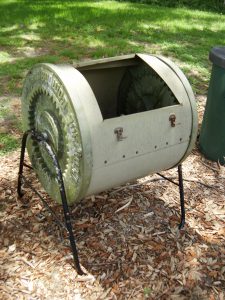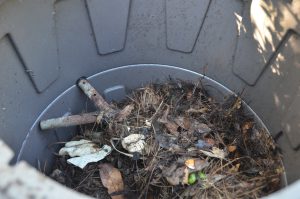Composting is a great way to practice recycling in your yard. You can reduce the volume of waste that goes to the landfill as well as create a beneficial soil amendment for your landscape.  Most people have all the elements they need to create a successful compost pile without purchasing a bunch of equipment. Kitchen waste, along with yard waste make a great mix for your compost pile.
Most people have all the elements they need to create a successful compost pile without purchasing a bunch of equipment. Kitchen waste, along with yard waste make a great mix for your compost pile.
There are many methods of composting so there is sure to be one that will fit your needs. Whether you have a small yard, a large yard, or live in a deed-restricted community; there is a method for you. Basic knowledge of how the process works will ensure your success in creating usable compost.
Your compost pile requires five basic elements to work.
- Moisture
Add water with a hose or bucket to your pile—a nearby rain barrel also works. The goal is to keep your compost “as moist as a wrung-out sponge.”
This happens when you turn the pile. The more you mix and aerate, the more quickly the waste will break down into usable compost. - Aeration & Oxygen
Add water with a hose or bucket to your pile—a nearby rain barrel also works. The goal is to keep your compost “as moist as a wrung-out sponge”. - Temperature
The temperature of your pile is important if you are using a “fast” composting method. It’s not so important if you are not concerned about getting compost quickly. - Particle size
Ideally less than two inches so that the material can break down quickly. Cut up thick, tough leaves and fruits. - Carbon to nitrogen ratio
The carbon to nitrogen ratio often seems like the most confusing part to get right, but if you know you are adding a “brown” (high carbon material like leaves, branches, or paper) add a “green” (high nitrogen material like grass clippings, fruit waste or coffee grounds) as well.
The methods of composting to choose from include cold composting, sheet composting, trench composting, fast composting, and vermicomposting.
With cold composting it can be as simple as layering “browns” (leaves, soil etc) and “greens” (kitchen scraps) in a bin and mixing and adding water as needed. Use this method if you don’t need the compost quickly and don’t add any diseased plants or weeds. This method requires very little effort.
Sheet composting is simply taking your pruning waste, leaves, grass, or other material and using it as mulch in your landscape beds. As these elements break down, they add valuable organic matter to your soil. If you use fallen leaves as mulch, you are sheet composting!
Trench composting is a great method if you have a lot of kitchen scraps but not much else. You simply dig a trench or hole and bury the scraps. Make sure the scraps are adequately covered with 4-6 inches of soil. This can be done at the base of plants or in mulched landscape beds.
Fast composting requires a bit more effort than other methods. With fast composting the pile temperature can grow to over 100 degrees and then rapidly cool down. As the pile cools, it will shrink in size and then more materials are added. This is the only method where you can add weeds and diseased plant material. To help the pile heat up you must make sure it is adequately moist and aerated by mixing it frequently. An optimum mix of brown and green material is also essential.
Finally, vermicomposting is the method where your scraps are composted by worms. There are many worm bins available for the homeowner to purchase but you can also make your own. The worms mix and add their castings to your compost and break it down very quickly. No yard waste is composted using this method.
Composting benefits both the environment and the landscape. Compost can increase water-holding capacity, availability of nutrients, and supports living organisms in the soil. Find out more about composting here: https://edis.ifas.ufl.edu/publication/EP323, or contact the Plant Clinic if you have questions on how to start a compost pile.
For more information, contact UF/IFAS Extension Polk County at (863) 519-1041 or visit us online at http://sfyl.ifas.ufl.edu/polk. The Plant Clinic is open Monday-Friday, 9:00 am-4:00 pm to answer your gardening and landscaping questions. Visit us in person, give us a call, or email us at polkmg@ifas.ufl.edu.
The Florida Master Gardener Program is a volunteer-driven program that benefits UF/IFAS Extension and the citizens of Florida. The program extends the vision of the University of Florida/Institute of Food and Agricultural Sciences, all the while protecting and sustaining natural resources and environmental systems, enhancing the development of human resources, and improving the quality of human life through the development of knowledge in agricultural, human and natural resources and making that knowledge accessible.
An Equal Opportunity Institution.
 1
1
